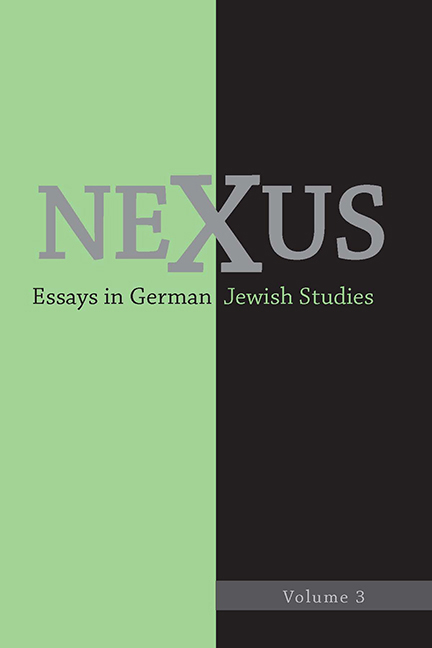Book contents
- Frontmatter
- Dedication
- Contents
- Acknowledgements
- Introduction
- “Ein weites Feld”: Ein Wort zu deutsch-jüdischen Studien anläβlich der Verleihung des ersten Egon Schwarz Prize for the Best Essay in German Jewish Studies
- “An Open Field”: A Word about German Jewish Studies on the Occasion of the Presentation of the first Egon Schwarz Prize for the Best Essay in German Jewish Studies
- Laudatio for Abigail Gillman's Prize-Winning Nexus Essay: “Martin Buber's Message to Postwar Germany”
- Heinrich Heine in Modern German History, by an Eyewitness
- Jeffrey Sammons, Heine, and Me: Some Autobiographical Reflections
- Heine's Disparate Legacies: A Response to Jeffrey Sammons
- My Debt to Heine and Sammons
- Die letzten Tage der Menschheit as a German-Jewish Tragicomedy, and the Challenge to Translators
- Edward Timms's “Die letzten Tage der Menschheit as a German-Jewish Tragicomedy and the Challenge to Translators”: A Response
- Kraus the Mouse? Kafka's Late Reading of Die Fackel and the Vagaries of Literary History
- The Parable of the Rings: Sigmund Freud Reads Lessing
- The Poetics of the Polis: Remarks on the Latency of the Literary in Hannah Arendt's Concept of Public Space
- The Marrano in Modernity: The Case of Karl Gutzkow
- German Jews Dogged by Destiny: Werewolves and Other Were-Canids in the Works of Heinrich Heine and Curt Siodmak
- Authenticity, Distance, and the East German Volksstück: Yiddish in Thomas Christoph Harlan's Ich Selbst und Kein Engel
The Marrano in Modernity: The Case of Karl Gutzkow
Published online by Cambridge University Press: 11 May 2017
- Frontmatter
- Dedication
- Contents
- Acknowledgements
- Introduction
- “Ein weites Feld”: Ein Wort zu deutsch-jüdischen Studien anläβlich der Verleihung des ersten Egon Schwarz Prize for the Best Essay in German Jewish Studies
- “An Open Field”: A Word about German Jewish Studies on the Occasion of the Presentation of the first Egon Schwarz Prize for the Best Essay in German Jewish Studies
- Laudatio for Abigail Gillman's Prize-Winning Nexus Essay: “Martin Buber's Message to Postwar Germany”
- Heinrich Heine in Modern German History, by an Eyewitness
- Jeffrey Sammons, Heine, and Me: Some Autobiographical Reflections
- Heine's Disparate Legacies: A Response to Jeffrey Sammons
- My Debt to Heine and Sammons
- Die letzten Tage der Menschheit as a German-Jewish Tragicomedy, and the Challenge to Translators
- Edward Timms's “Die letzten Tage der Menschheit as a German-Jewish Tragicomedy and the Challenge to Translators”: A Response
- Kraus the Mouse? Kafka's Late Reading of Die Fackel and the Vagaries of Literary History
- The Parable of the Rings: Sigmund Freud Reads Lessing
- The Poetics of the Polis: Remarks on the Latency of the Literary in Hannah Arendt's Concept of Public Space
- The Marrano in Modernity: The Case of Karl Gutzkow
- German Jews Dogged by Destiny: Werewolves and Other Were-Canids in the Works of Heinrich Heine and Curt Siodmak
- Authenticity, Distance, and the East German Volksstück: Yiddish in Thomas Christoph Harlan's Ich Selbst und Kein Engel
Summary
In Karl Gutzkow's Uriel Acosta the multiple ironies of using a radically isolated, heterodox Marrano to express the rebelliousness and frustration of a predominantly Christian, liberal intelligentsia reflect the dangerous admixture of philo- and anti-Semitic tendencies that characterized the protracted German unification process as a whole. In its embrace of the rebellious Marrano as hero, the majority culture in effect proclaims that Jews are acceptable only to the extent that they reject their rabbinic culture. In adopting the voice of a sixteenth century anti-clerical rationalist, the play sidesteps the critical contemporary issue of the role of the Jew in a modern state. Gutzkow's multivalent use of the Jew thus underscores the ambiguity of his and his audience's ostensible embrace of the Jewish cause.
THIS ESSAY IS PART OF a larger analysis of the nature of a Jewish identity disrupted by conversion. Specifically, I argue that within the complexities of the German Jewish encounter with modernity, an encounter marked by enormous creativity and ever-evolving boundaries, a surprisingly strong, even fierce sense of Jewish identity persists within the world of the Jewish convert, as illuminated in selected literary texts. In examining the emergence of the phenomenon of conversion and the persistence of Jewish identity among acculturating Jews, I look back to the Marrano, as the nineteenth-century German Jewish world so often did, as antecedent, paradigm, and visible example.
Recent scholarship has examined the role of the Marrano as an emergent trope in the newly popular genre of historical fiction aimed at an evolving German Jewish readership in the process of re-conceptualizing its past. My focus, in contrast, is on the complexities of the more intercultural thrust of Karl Gutzkow's highly popular 1846 play,Uriel Acosta, whose historical Marrano protagonist is recast as a heroic freethinker in a thinly-veiled commentary on contemporary politics. Written by a non- Jew, this play suggests that the appropriated figure of the Marrano can serve to illuminate not only the complexities of a nineteenth-century German Jewish landscape, but also the emergence on a wider scale of a contested German and Eastern European modernity in which the figure of the Jew was to play such a problematic role.
- Type
- Chapter
- Information
- Nexus 3Essays in German Jewish Studies, pp. 123 - 144Publisher: Boydell & BrewerPrint publication year: 2017



